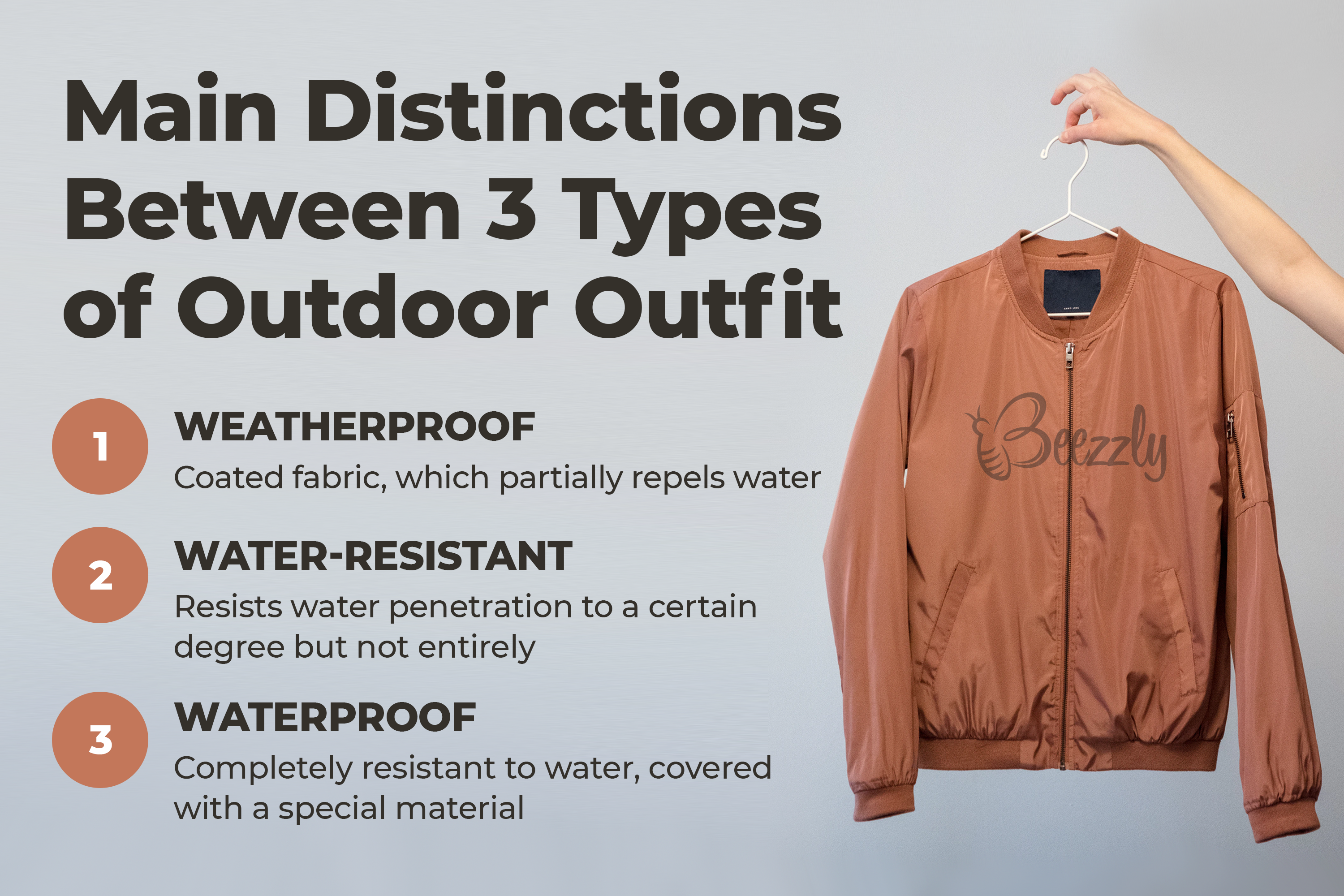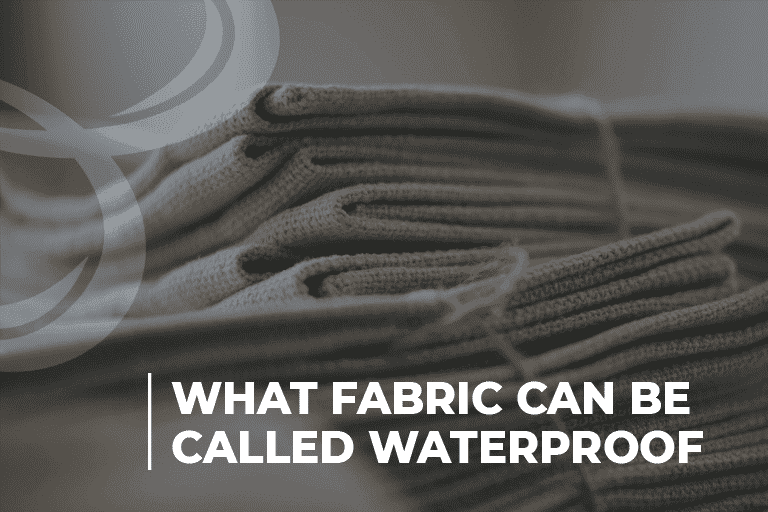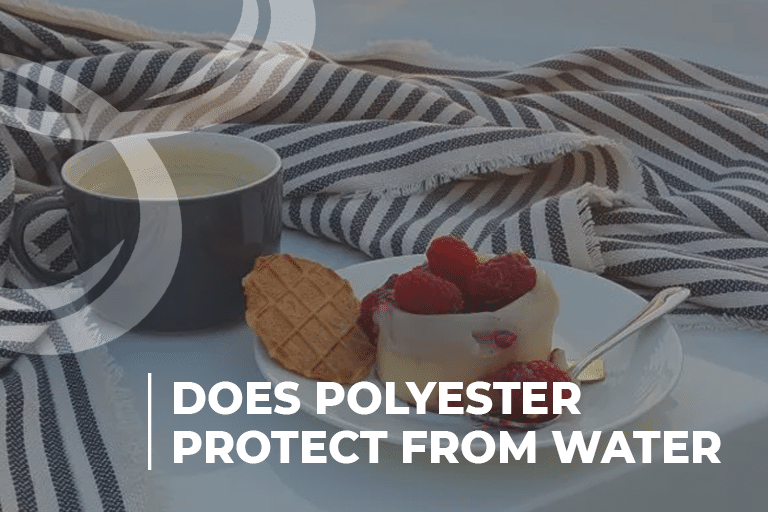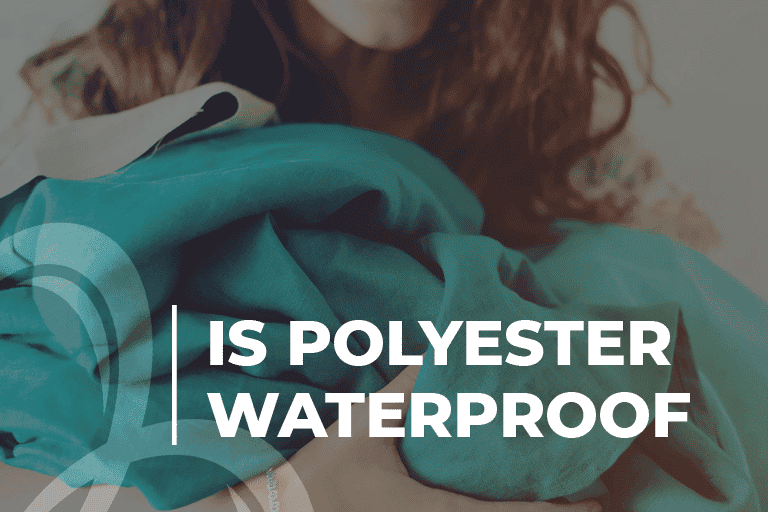Polyester is one of the fabrics which can be breathable and waterproof at the same time. Depending on the density, and the number of threads, the water-resisting properties of polyester increase. Even 100% polyester fabric can’t be 100% waterproof until it has been treated with water repellents or it is coated with a layer of extra fabric.
So, is polyester waterproof? Yes, polyester is waterproof. But it depends on the number of treads that were used and the polyesters density. More threads equal more waterproof abilities. Water-resistant abilities of polyester increase if the fiber was coated with a special cover, for example, rubber.
Are you an outdoor person? If yes, then you probably know very well how important it is to have a good waterproof outfit to walk in the rain and not get soaked.
Since the market is loaded with polyester items today, many people believe the manufacturers who claim their garments are waterproof and buy polyester outdoor clothing.
And Can polyester get wet? Yes, polyester can get wet. It depends on the thickness of the fabric and the number of threads that were used. The tent will repel any water that comes, but the leggings we use will be damp in minutes. Also, polyester dries very fast.
But wait, is polyester that waterproof at all?
That’s what we are going to figure out today!
What Fabric Can Be Called Waterproof?
If we go to the nearest store and find a section with outdoor clothing, we will see how varied it is. Some items labels say those are water-resistant, others state that the apparel is waterproof. We can even find weatherproof clothing!
We basically know the distinctions between each of those types of water-resistant material. The lowest level of protection belongs to repellent fabrics, whereas resistant ones will provide their owners with a better ability to keep them dry underneath the apparel. As for the waterproof outfit, it is an ideal choice for harsh weather conditions.
Are you already confused? We are, too. That is why we suggest everyone to clarify once and for all what are the distinctions between those three types of outdoor outfit we just mentioned.
[table id=34 /]
Surprisingly, some people wonder whether a polyester item will shrink when exposed to rain. Let’s see where this belief comes from.
This material does indeed get smaller but not after any exposure to water. Polyester items tend to shrink when washed in hot laundry or exposed to heat in the drying barrel. As you could guess, polyester shrivels after being exposed to heat, no matter whether in hot water or while drying.
So for the outdoor outfit, rain is not a problem, but if you need to make your polyester garment smaller for purpose, there are several ways how to shrink polyester. Only make sure it will be done correctly to keep the artificial textile wearable.
Does polyester fade? Polyester usually doesn’t fade, so it will not change its color for quite a long period of time. Also, if the fabric was blended with polyester, it will not lose its color because of polyester properties. SO you can wash and dry it, and it will be the same for years.

Does Polyester Protect From Water?
So what about polyester?
Can it be used as a 100% effective water protection for walking in heavy rain?
Does polyester repel water? Yes, polyester can repel water, it depends on the number of threads that are used. If the polyester is thick, like in a tent, it will protect you from water. But if it is as thin as we wear in daily life, it will be wet fast, but it will dry much easier than any other fabric?
Is polyester jacket waterproof? The Polyester jacket is waterproof for quite a short time, around 15 minutes in heavy rain, or 30 minutes – 1 hour on breezy rain or snow. You could use it underwater unless it were covered with an extra protective layer, like rubber.
First, we need to note that polyester itself is waterproof indeed, but that refers to the fibers only. It means that if we take a solid material and expose it to water, it will stay dry. But! Since the fabric is woven, there are air gaps between the threads. And even though the threads don’t get soaked, the gaps will let water underneath the clothing making its owner slightly soaked.

But don’t be deceived with those air gaps. It may seem that due to them, polyester is highly ventilated, but in fact, is polyester that breathable? Even though it has certain breathability, it is too weak for making you feel comfy in hot weather or during intense training.
And is polyester strong? Yes, polyester is a strong fabric and is very stretchy. It can handle around 7 kilograms, depending on the number of threads. Since the polyester is plastic, it can handle much more weight depending on the fabric and its maintaining properties

That is why most of the outdoor garments made of this material can be good only for the light showers, but not for heavy continuous rain.
However, if polyester is coated with special finishes, it can gain that waterproof power everyone desires. Of course, such apparel will cost more since the process of coating is extremely time and money-consuming.
So, does polyester absorb water? It is a hydrophobic material. But it depends on the fabric thickness and on the number of threads that were used. If polyester is thin, it will absorb water and become damp. If it is thick like a tent, it will not absorb any water at all.
That is why manufacturers found a way to make polyester more water-resistant by simply increasing the number of threads and thus making the gaps between them smaller.
Another option is to apply an extra protective layer on top of the fabric. But none of these approaches will make the garment completely waterproof, rather water-resistant.
And Is polyester UV Resistant? Polyester thread can protect you from UV radiance. It is often used for special UV protection cloths. It Protects you from UVA and UVB rays exposure, but if you are outside for longer than 20 minutes, you should always use the extra cover of UV protection On You.

What is polyester flammability rating? Polyester is not highly flammable. But since it is plastic by its nature, it melts and can cause severe harm and burns. So polyester is the wrong choice for a heat or flame protective cloth.
We hope now you’re more aware of the difference between various water-resistance levels of fabrics and you will choose your next raincoat wisely!
[wp-faq-schema title=”Frequently Asked Questions”]

Is 100% polyester stretchy? I want to try a pure fabric but a bit unsure whether it’ll stretch.
If it has no additional stretchers like spandex, then it will not stretch that much, at least, no more than cotton or other natural fiber.
Is 100% polyester water-resistant? I need to buy an outdoor jacket but I don’t know what fabric to choose.
If you have no heavy rains where you live, then polyester is fine since it repels water well. But if you have heavy rains often, I’d recommend something different.
Hi! Can anyone help me a bit? What type of fabric is waterproof? Which one will be better for hiking?
I’d say you need oilcloth or TPU, or laminated cotton, especially if you’ll be hiking in the rainy area.
Does anyone know, are polyester and cotton waterproof?
No, not quite. They are rather water-resistant since you’ll anyway get soaked if caught by the heavy rain in one of those.
What’s the best waterproof material for a yacht trip?
I’d recommend nylon or coated nylon, even polyurethane-coated. Those will stand the sea weather best of all, believe me! I sail often and this fabric always works the best.
Is polyester good for rain? I’m looking for something light that can repel a light shower.
Yes, for this purpose polyester is just fine.
Hi! Here’s the case folks: me and my friends, we are going for a one week vacation to the mountains. And I know that the weather will be rainy while we’re there. So right now I’m thinking of buying more pure polyester clothes since my wardrobe consists mostly of cotton, linen and other organic fabrics. And I know they’re not water-resistant! But here’s the question: is 100% polyester waterproof? Or at least water-resistant?
Hey there! As far as I know, even the pure polyester is not waterproof. However, it can be considered water-resistant to a certain point. I mean that even if it’s a 100% polyester, it still should be covered with a special water-resistant coating to be able to not absorb water. So I guess you should ask a salesman in a store whether or not the clothes you want to buy are water-resistant.
If you compare nylon vs polyester, which one is more waterproof?
First of all, I’d say that these fabrics are not waterproof, they are more like water-resistant. And if we compare them, polyester will show better water-resisting properties.
Is a polyester backpack waterproof? I have recently found a really cool one on Amazon, but since it’s made of polyester, I’m not sure how well it will epes water. I’m looking for a backpack to take with me to the mountains and to the walks,see, and since I’m walking anytime, both in rain and sun, I need that backpack to be really durable! SO what would you say about the polyester one?
Hello. Well, a polyester backpack is surely not waterproof since this material has no such properties. However, if it’s covered with a special coating, it can have quite nice water-resistant properties! I used to have one like this, and it managed the light snow and showers pretty well.
Is a polyester coat waterproof? Or should I start looking for a raincoat at once?